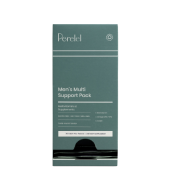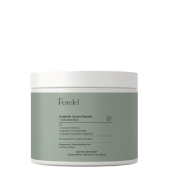The first few months of pregnancy can be an exciting experience. But, let’s be real—they can also be exhausting. Your body is getting used to its new job to grow a human—and the body’s response to its new job (hello, hormones!) may leave you feeling emotional, exhausted, and probably a little nauseous.
Alongside a solid prenatal vitamin, healthy eating during pregnancy time helps ensure you're getting all of the essential nutrients to meet your needs. “Your nutrition and diet during pregnancy is setting the foundations for the future health of your baby,” says Stephanie Lauri, Registered Dietitian and member of the Perelel Panel.
But a healthy diet doesn't just have a profound impact on your growing baby, the food you choose to eat can also impact you—and play a major role in helping to ease some of the more challenging first trimester symptoms, like exhaustion and morning sickness.
So, the question is: As you navigate your first trimester (and any food aversions that might pop up), how can you maximize your diet to not only deliver the nutrition you need to keep you—and your baby!—healthy, but also manage any less-than-thrilling side effects that pop up during early pregnancy?
To set yourself up for success, here are some dietitian-approved tips and recommendations to help support your symptoms and nourish your body during the first trimester.
Why diet is so important in the first trimester
Your nutritional health history and current lifestyle influence important pregnancy outcomes for both mom and baby. “Diet is important in the first trimester—and even before you get pregnant—to build your nutrition stores,” says Lauri. “By only eight weeks gestational age, all essential organs and bones are beginning to form in your baby,” says Lauri. “Specifically, nutrients Vitamin B9 (also known as Folate)1 and Choline2 are crucial for brain and spinal cord development, which happens so early in pregnancy—often times before some even know they are pregnant.”
Additionally, your nutritional intake during pregnancy and early life impact not only physical development, but also the risks of congenital anomalies, cognitive and behavioral development, and metabolic adaptations that can affect long-term risk of obesity and future diseases. This can determine gestational hypertension and diabetes, preterm delivery, and fetal growth restriction. In short, a nutritious diet runs parallel with a healthy pregnancy.
OB/GYNs recommend starting a prenatal vitamin regimen 6 months before you’re ready to start trying to conceive.Doctor Tip!
Because these nutrients are so essential to the health and development of the baby, it’s important to prioritize them in your diet—which can help prevent defects as the baby grows. “Getting in enough of these nutrients in early pregnancy can help prevent neural tube defects,” says Lauri.
What about calories?
Because your body and your baby are growing and changing in different ways throughout your pregnancy, there are different nutritional demands as your pregnancy progresses. The amount of calories you require beyond your regular diet depends on where you’re at in your pregnancy. Here is a look at daily calorie needs by trimester. In general, your body does not require any extra calories during your first trimester.
Keep in mind that you are your baby’s sole source of nutrition. If you fill your plate with healthy foods, you help ensure that your baby will grow and thrive. Try to avoid eating too many empty calories that come from added sugars and fatty foods, as these offer little nutritive value for you and your baby. Additional calories should come from nutrient-dense foods like lean protein, whole grains, healthy fats, vegetables and fresh fruit.
Shop the Article:
Essential nutrients for the first trimester
Iron. Your body needs iron to increase blood production so nutrients and oxygen can be delivered to the placenta. Iron deficiency in pregnancy is the most common nutrient deficiency worldwide and is associated with the risk of low birth weight and preterm delivery, according to a recent study, Macronutrient and Micronutrient Intake During Pregnancy. Food sources of iron include meat, poultry, fish, legumes, dark green veggies, fortified cereals, and grains.
Folate. Folate is important in the early stages of pregnancy where there is rapid tissue growth, neural tube formation, brain development, and DNA synthesis. Foods that contain folate include green leafy veggies, legumes, citrus, fortified breakfast cereals, and grains. Supplementation during preconception and early pregnancy can prevent forty to eighty percent of neural tube defects.
Vitamin B12. Vitamin B12 is essential for neural tube formation and the development of the neurological function. B12 insufficiency affects 25 percent of pregnancies worldwide and impacts cell growth and nerve tissue development. Vitamin B12 is only found in animal products, so those who follow a vegan or limited vegetarian diet may require additional supplementation. Dietary sources include dairy products, meat, poultry, fish, and eggs.
Vitamin D. Vitamin D is necessary for skeletal development, regulating gene expression, and immune function. Women require more vitamin D than normal during pregnancy to support their baby’s growth and development. It is estimated that forty to 98 percent of pregnant women globally are vitamin D deficient. And women who live in environments with minimal sun exposure, have darker complexions, or who protect their skin from sun exposure are at a higher risk for insufficient levels of vitamin D. Opt for food sources such as fatty fish (like light-canned tuna, mackerel, and salmon), egg yolk and dairy.
Iodine. Iodine is required for thyroid hormone production, which increases by fifty percent in early pregnancy and is essential for brain and nervous system development. The best sources of iodine are seaweed, seafood, and iodized salt. “Salmon is a nutrient powerhouse,” says Lauri. Packed with omega-3 fatty acids, salmon healthy for a variety of reasons, “but specifically, is a good dietary source of iodine,” says Lauri.
Just make sure the salmon is cooked; the American College of Obstetricians and Gynecologists (ACOG) recommends pregnant women avoid all raw or undercooked fish, as they are more likely to contain parasites and/or bacteria. (Don’t worry, you can get back to your regularly scheduled sushi consumption after the baby arrives.)
Choline. Choline is an essential nutrient that is critical for brain development, neural tube formation, and cellular growth and metabolism. Deficits in early life can have a long term impact on brain function. Ninety to 95 percent of pregnant women do not meet adequate intakes for choline.3 Rich sources of choline include eggs, beef, fish, poultry, dairy, soybeans, wheat germ, shiitake mushrooms, kidney beans, and red potatoes. “Eggs are a pregnancy superfood due to their nutrient profile,” says Lauri. “ an especially good source of choline; two eggs—the yolk specifically—give you about half of your daily choline requirements during pregnancy."
Eating for your symptoms
Your diet can help support your baby as they develop through your first trimester. But the foods you munch on during those first months of pregnancy can also help you in another way—by helping you manage, treat, and control your less-than-ideal pregnancy symptoms, like morning sickness, exhaustion, or heartburn.
So, if you want your diet to treat your pregnancy symptoms, what should you put on your plate?
“My biggest suggestion for improving nausea/morning sickness, heartburn and energy (there's nothing like first-trimester-pregnancy tired!), is to eat balanced meals and snacks,” says Lauri.
What makes a meal balanced?
“It's eating protein, fat, and carbohydrates together—and not eating carbs by themselves,” says Lauri. “Carbs tend to be the preferred nutrient, especially when you're feeling sick; however, eating carbs alone can cause a blood sugar rollercoaster—potentially making your symptoms worse.”
So, while you might be tempted to eat all the pasta and bread and donuts you can get your hands on (we’ve all been there!), look for foods that have more of a healthy balance of protein, fat, and carbs.
For example, “one of my favorite foods that can be an easy addition into lots of different foods is whole fat Greek yogurt or cottage cheese,” says Lauri. “They're balanced in themselves with carb, protein, and fat, and also contain nutrients like iodine, Vitamin D, Vitamin A, and calcium.”
- If you’re going to eat crackers, dip those crackers in cottage cheese.
- If you’re having a carb-heavy breakfast (like oatmeal or toast), add a Greek yogurt on the side to lend more balance to the meal.
If you’re looking for a sturdier meal, “Beans and lentils—or in the form of chickpea or lentil pasta—are another great alternative with more protein and fiber to help balance the carb,” says Lauri.
Let us personalize your vitamin
routine in 60 seconds.

What are your
stage-specific needs?
Tips for your first trimester diet
Are you pregnant and looking to adjust your diet for the rest of your first trimester? Thinking ahead on a potential meal plan for when you do get pregnant? Here are some expert tips for building a first trimester diet that works for you and your baby:
Start by adding things
Changing your diet can be hard. And it can be especially hard when you’re also navigating the excitement and challenges—and cravings!—that can go along with early pregnancy.
So, instead of trying to completely overhaul your diet and say goodbye to the foods and snacks that have your heart, consider taking a different approach—and instead of removing less-than-healthy foods from your diet, focus on adding healthier options to each meal and snack.
“Start with something you might be craving or a food you know you can tolerate at the moment—then figure out how you can add nutrition to make it more balanced or nutrient dense,” says Lauri.
For example, if you’re craving a bagel, add an egg and some avocado for a more balanced breakfast sandwich. Or, if pasta feels like an absolute must, top it with olive oil and mix in some grilled chicken and veggies. If you crave something sweet, citrus fruits like grapefruits and oranges, are rich in folic acid.
Think ahead
When you’re tired or hungry or stressed or sick, it can be hard to make good choices with your diet. And when you’re pregnant, those physical and emotional experiences can be amplified, making choosing the right foods even harder.
That’s why it can be helpful to think ahead, and instead of choosing what you’re going to eat in the moment, have a plan for what (and when) you’re going to eat—and then have those foods prepared and ready to grab when you’re hungry.
“Having a loose plan can be helpful during the first trimester,” says Lauri. “Having different options prepared or ready to go can make all the difference when you're tired and struggling with nausea; instead of having to come up with something to eat, you have options waiting for you.”
Start with a protein
If you’re struggling with morning sickness—or middle of the night sickness—Lauri recommends having protein-filled healthy snacks on hand.
“If you wake up feeling nauseous first thing in the morning, keeping a protein forward snack at your bedside for the middle of the night or in the morning before your feet hit the ground,” says Lauri. “This may help set you up for success with less nausea throughout the day.”
Another tip for combatting nausea is to sneak your nutrients in with a protein-forward smoothie. (Hot tip: Perelel's 1st Trimester Prenatal Vitamin Powder was made for anyone struggling to gulp down pills during this time).
Eat smaller meals, more often
Many people prefer to eat big, hearty meals (and when you are pregnant, you can be hungry!). But if you want to eat in a way that helps you better manage your pregnancy symptoms, Lauri recommends swapping out your large breakfast, lunch, and dinner in favor of eating smaller meals more frequently.
“Small more frequent meals every couple of hours may be easier to tolerate and keep your blood sugars more stable ,” says Lauri.
Prenatal vitamins for your first trimester
Alongside all the healthy foods in your grocery cart, a prenatal vitamin can help fill any nutritional gaps to ensure you're getting exactly what you need, when you need it. But not all prenatal vitamins are the same. When shopping for a prenatal vitamin look for clean, high-quality ingredients in absorbable—or bioavailable—formats. Meaning: Your body can actually use all the nutritional ingredients in your prenatal. In addition, pregnancy is such a complex time. And what your body (and baby!) needs in early pregnancy is different than later pregnancy. That's why Perelel prenatal vitamins were made by leading OB/GYNs and maternal-fetal medicine doctors and deliver targeted nutrients for each unique trimester of pregnancy. So you're not only nourishing your growing baby, but also alleviating mom's pregnancy symptoms, too.*
Sign up to receive doctor-backed, stage-specific content in your inbox each week.
theFolio in Your Inbox
Foods to steer clear of during your first trimester
Seafood Containing Mercury
Eating fish with high levels of mercury (such as swordfish, mackerel, and ahi or bigeye tuna) can cause mercury poisoning, which may be passed on to your baby. Mercury can delay your baby’s development, cause brain damage, and affect development of hearing and sight.
Raw or Undercooked Seafood, Meat, and Eggs
Raw food can contain bacteria that can cause infection and food poisoning. This infection can pass on to your baby during pregnancy, so it might be best to avoid raw or undercooked seafood, meat, and eggs.
Unpasteurized Milk and Soft Cheeses
Unpasteurized milk and dairy products like cheese may contain bacteria such as listeria. Check the label to ensure that the product you’re buying is pasteurized. In general, best to avoid unpasteurized soft cheeses like blue cheese or gorgonzola, brie, feta, camembert, and chevre. Sorry.
Excess Vitamin A
In your first trimester, avoid having vitamin A supplements and liver products like pâté as they may contain high vitamin A levels. A high dose of vitamin A can be toxic for your baby and cause birth defects.
Nutrition during pregnancy—and in particular, the first trimester—plays a huge role in not only how you feel, but how your baby develops. And now that you know what an ideal first trimester diet looks like, all that’s left to do? Get out there and create your diet (and eat your way through it).
References:
- Eva F G Naninck,1 Pascalle C Stijger, and Elske M Brouwer-Brolsma; The Importance of Maternal Folate Status for Brain Development and Function of Offspring; May 2019.
- Steven H. Zeisel; Choline: Critical Role During Fetal Development and Dietary Requirements in Adults; June 2008.
- National Institutes of Health: Folate Fact Sheet for Professionals
- Harvard T.H. Chan School of Public Health: Iodine.
- Shikha Singh; Sartaj Sandhu. Thyroid Disease and Pregnancy. July 2023.
- Mayo Clinic; Pregnant? Iodine is essential for your baby’s developing brain; November 2023.
- American College of Obstetricians and Gynecologists; Can I eat sushi while I'm pregnant?; November 2021.
- Brennan, Dan. “What Foods Should Be Avoided During the First Trimester of Pregnancy?” MedicineNet, https://www.medicinenet.com/foods_avoided_during_the_first_trimester_pregnancy/article.htm
Be sure to complement your healthy diet with the 1st Trimester Prenatal Pack complete with targeted nutrients formulated for the unique needs of the 1st trimester. We want to hear how your pregnancy journey is going! Join the Perelel community on social or subscribe to our newsletter to be a part of the conversation.
This article is for informational purposes only. It is not, nor is it intended to be, a substitute for professional medical advice, diagnosis, or treatment and we recommend that you always consult with your healthcare provider. To the extent that this article features the advice of physicians or medical practitioners, the views expressed are the views of the cited expert and do not necessarily represent the views of Perelel.


























